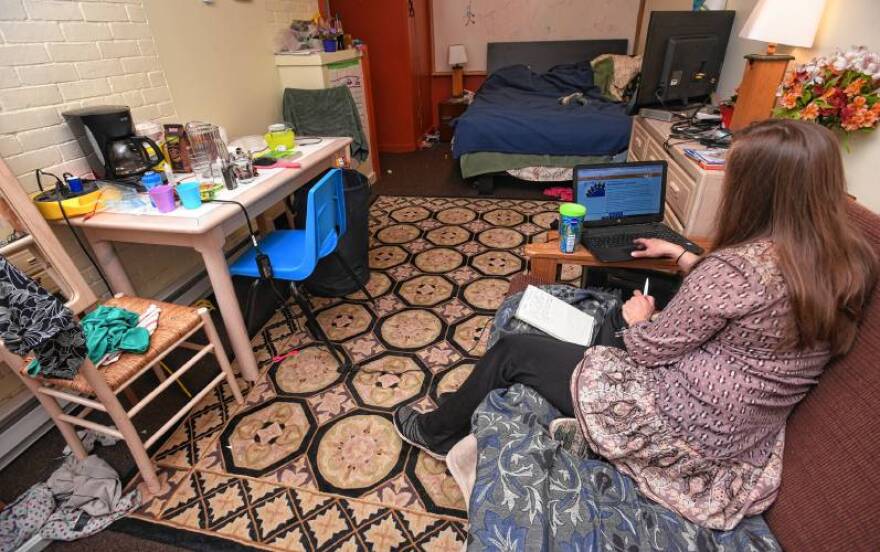On a recent morning, Irida Kakhtiranova was rolling out a ball of dough on the metallic table in the Unitarian church kitchen in Northampton, Massachusetts.
“You don't want it to be too thick. You don't want it to be too thin,” she said. “And I can tell by just feeling it with my fingers.”
Kakhtiranova was not much of a cook growing up in Russia, but she did like to eat the traditional dumplings called pierogies.
After she moved to the United States 15 years ago, she tried the supermarket brands, but they tasted awful. So she learned to cook them herself, using a mold she bought off of the internet.
“I was making it by hand for a while, but the edges are not pretty,” she said. “And if you end up doing every single one of them with a fork, it takes a wicked long time.”
Kakhtiranova, now 36 years old, is friendly and talkative – often hanging out and laughing with church staff and volunteers in the kitchen. So it’s easy to forget she’s a fugitive from the government.
The church is her sanctuary from U.S. Immigration and Customs Enforcement, while her husband raises their 10-year-old son and 4-year-old twin girls. She's been here for a few months.
“I had to think of a way to make money while I’m in here and keep my mind busy,” she said. “I'm nervous and worried every single minute of the day. Cooking puts my mind at ease, where I don't think about it for a short period of time.”
So Kakhtiranova decided to make pierogies in the church kitchen -- and sell them.
“I have potato, cheddar and bacon, cauliflower, farmer's cheese and potato with garlic, spinach and feta cheese,” she said.

Kakhtiranova grew up in the Ural Mountains of Russia. She said her Muslim community there was hostile when she had a relationship with a woman.
“When I was different from other people, they didn't take me well," she said.
So she came to the U.S. under a temporary visa and later applied for asylum. She met her future husband while bartending in Florida, and they moved to western Massachusetts.
In 2007, she said she received an order for deportation, but every year for the next 10 years, she was granted a legal stay to remain.
“I've been working the whole time,” Kakhtiranova said. “Never used an illegal name. I've been paying taxes. I've been checking in with immigration [officials].”
Last summer, her stay was denied, and that’s when she started to panic.
Kakhtiranova learned in April that the Unitarian Society of Northampton and Florence -- like other parishes around the region -- would provide sanctuary for undocumented immigrants. She quit her waitressing job and moved in.
She said she hasn't gone outside since. She gets fresh air by sticking her head out the window.
"And as hard as it is, it is better than the alternative, which would be either a cell or Russia,” Kakhtiranova said.
"How do you explain to a four-year-old that mommy is not home? How do you explain immigration issues to a four-year-old?"
Irida Kakhtiranova
She's never alone. Volunteers stay in the church around the clock. Kakhtiranova has been living off of food donations – and community members have given her cooking equipment and supermarket gift cards to buy the raw ingredients for her business.
Pierogi orders usually come in by email or phone. So far she’s sold about 50 batches – at $10 a dozen. She said it's her family's only income.
“I went from fully independent to depending on people for everything -- laundry, grocery shopping. You name it, I'm dependent on it,” she said. “And making a little bit of this money, $10 at a time, gives me my confidence back.”
But Kakhtiranova misses her children, who Skype her every day and visit, with her husband, a few times a week.
“How do you explain to a four-year-old that mommy is not home?” she said. “How do you explain immigration issues to a four-year-old?”
And she misses married life.
“It's like being divorced without being divorced,” Kakhtiranova said, holding back tears. “I miss the snoring! I never thought that I would say that. It's too quiet. I turn the fan on just so there is some noise some background noise.”

By now, she knows her way around the church kitchen. "Do you see the wooden cutting board behind the pizza pan? Can you hand it to me?” Kakhtiranova asked the pastor, Rev. Janet Bush, who was helping out for a few minutes.
“It’s not normal. It’s not home,” she said, “but it's as close as you get to it.”
On that day, the church basement was about to be turned over to an AA meeting, so she had to finish up her last batch of pierogies. Kakhtiranova plucked them out of boiling water, and drained them in a colander.
“After that, you just fry them up with butter,” she said. “If you want, throw some sautéed onions on top, maybe some chopped bacon.”
Kakhtiranova has no idea how long she'll stay in the church. She plans to put some of the pierogi money towards legal fees for her asylum case.
“It makes me think there is a strong hope that my case will go well,” she said. “And when it does happen, I will open my business and now will already have a clientele waiting for it.”






